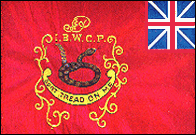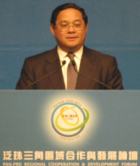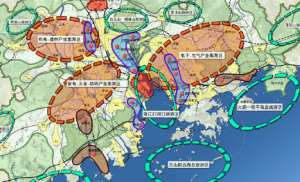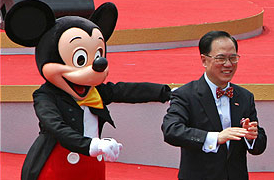


With the first cold winter winds sweeping down from Siberia, and mindful of the fact that up to half our body heat loss occurs from the head, I must decide on a trendy and fashionable hat for the season. Of all the stylish boutiques in IFC Mall, my favourite is Agnes b, because it was named after a real person, and a modest one who valued her anonymity at that. This is in sharp contrast with the other luxury outlets, all of whose names were devised by committees of men in pony tails and red-framed glasses at advertising agencies. My mind drifts back to a time when I had the misfortune to attend such a meeting. Tasked with dreaming up a product name to convey particular ethnic, linguistic and cultural features that would appeal to specific demographic markets, the ad men passed a bong around the table, scribbled words down and took it in turns to read them out while trying not to laugh.
Foreign branding whiz 1 – “OK guys, how about this for the sexually liberated Chinese chicks who are into all the renaissance, baroque image thing … Francesco Biasia. Francesco for the really Italian feel, right? Bi as in… you know, ‘bi’. And Asia as in, like, Chinese.”
Foreign branding whiz 2 – “Wow. OK, how about this… Ermen… Ermen… Damn, I wrote it and I can’t even pronounce it… Ermenegildo Zegna.”
Foreign branding whiz 3 – “Holy shit – that’s classic man! Just pure genius!”
Foreign branding whiz 2 went on to create the name Haagen Daz.
I am torn between the ‘manual labour’ brown cloth cap, which is basically a working class Anglo Saxon version of the French beret, and the more raffish, slightly nautical-looking peaked leather cap, which bears a faint resemblance to something sported many years ago by Lenin. Proletariat or dictatorship thereof? Whichever I choose, I have no doubt whatsoever that I will stand out as I glide down the Mid-Levels Escalator in the morning. People will look at me and say – there goes someone so outstanding he probably qualified to live here under the Quality Migrant Admission Scheme. Vivienne Tam is a real person too. I will check out her men’s headwear, as well.



First, I tell him, there was a speech by one of the half dozen or so clones of tycoon Victor Fung that open all these Pearl River Delta Opportunities and Challenges functions. Then, Secretary for Constitutional Affairs Stephen Lam took the podium in his capacity as most weasel-like and under-employed Government Minister. He blathered on about Guangdong Province’s 11th Five-Year Plan as if it were something to be taken seriously, the bizarre PR gimmick CEPA (ditto), and the bridge that will link Hong Kong with all the lovely 10-ton trucks on the other side of the Pearl River if Mainland officials can screw enough cash and favours out of us.
Edward Leung, Chief Economist of the waste of space known as the Trade Development Council, presented some research on Guangdong’s economic restructuring. The usual, hand-wringing, desperately-seeking-a-role gibberish about how Hong Kong is going to be marginalized. We must convince the Mainland to open its services sector to our companies, he declared, adding hopefully that we are complementary, not in competition. Why can’t these experts accept basic realities – labour across the border is dirt cheap, and local officials up there hate us but lust after our reserves? Seek truth from facts.
Then, George Leung of the Greater Pearl River Delta Business Council explained his research on development of the west bank of the delta – the relatively under-utilized area between Macau-Zhuhai and Guangzhou. There is something slightly scary about someone in this day and age who seems to take central planners’ work seriously. Under the Province’s Five-Year Plan, he informed us, Guangzhou and Shenzhen are officially classified the delta region’s drivers, while Zhuhai gets a pat on the head as a sort of sub-driver. For evidence of ‘clear planning’ of the distribution of industry, he referred the audience to a map showing how logistics, hi-tech, leisure, petrochemicals and other industries are being assigned to different zones, clusters and bases, all lovingly detailed in different colours.
To students of the political use of maps, this is a delight. Hong Kong sits forlorn, without any colour, surrounded by areas of bustling activity. Even the rocks sticking out of the water to our south have been designated an exciting economic role. It is all around us, and we are left out.


I am about to tell the Big Boss this when I notice he is starting to fall asleep, so I conclude my report on the seminar at this halfway point – which is just as well, because I left during the tea break and, indeed, goofed off.
Wed, 15 Nov
Breakfast with curvaceous Administrative Officer Winky Ip, who has suffered a tragic career setback. “I really wanted to be posted to the 10th Anniversary Celebrations Preparatory Office,” she complains, moodily spooning peanuts into her congee. “It would have been a wonderful chance for me to use my imagination and creativity.”
I try to think of something lamer. “Fireworks?”
“Fireworks!” she blurts out. “I was going to say that. Umm… An exhibition on ‘One Country Two Systems’. And a maybe an international conference on it. Umm… Sports events. Maybe… infrastructure projects.”
A vision of more harbour reclamation to make space for an eight-lane ‘One Country Two Systems’ freeway passes through my mind. “You could have a birthday party for all kids born on July the first, 1997,” I suggest.
Winky frowns slightly, then shakes her head. “No, I don’t think we can do that – it’s never been done before.”
The reason to froth at the mouth du jour is… freeloading Mainlanders using our hospitals and then running away without paying their bills – or, as we say in the genteel Mid-Levels, use of public medical services by non-eligible persons. The interviewer on RTHK Radio3 this morning was so incensed by this defrauding of the Hong Kong taxpayer that he gave the inoffensive and personable Hospital Authority Board member Dr Kwok Ka-ki a verbal mauling that bordered on the psychotic (and, it goes without saying, mis-pronounced the good doctor’s name).
The outbreak of rabies on the airwaves may have something to do with the fact that the Great Mainlander Medical Scam of 2006 has been brought to our attention by the Audit Commission, a department that usually dedicates itself to finding waste and mismanagement at RTHK. By savaging him for frittering away public resources, the station is projecting its self-hatred onto Kwok.
What to do about all the Mainland women giving birth in Hong Kong and not paying their bills? The Audit Commission comes up with predictably weak ideas. One is not to let these people darken the fragrant harbour a second time, but this will not be much of a deterrent because by this time they will have absconded across the border with their one permitted child. Another is to somehow encourage Mainland visitors to get medical coverage, perhaps by getting their tour guides to lock them into an insurance agency and not let them out until they’ve bought something. The fact is that unpaid hospital bills are simply another free lunch from the people of Hong Kong to the parasitical tourism industry, along with Disney, the deadly Ngong Ping 360 cable car and the forthcoming cruise terminal. The number of tourist arrivals is sacrosanct and must grow month after month for ever and ever – regardless of how penniless or bill-dodging the hordes are – or Hong Kong will evaporate into thin air.
My remedy is elegant, moral and financially sound. We have ‘one country two systems’. Now we can also have ‘no money, no baby’. Or maybe ‘cash after delivery’. (Catchy slogans are bursting out of me this morning.) Under my plan, the newborn is kept at the hospital and the Mainland mother given one week to pay up. If she fails to do so, the infant can be offered for a very handsome price to one of those strange American couples that feel a desperate need to have a Chinese child. They get their little Oriental trophy. The hospital makes a profit. The kid gets to be raised in a free society as a decent and honest citizen who pays his or her bills. And the Mainland mother gets a valuable lesson not to mess with other people’s obstetrics services. This is about as win-win as it gets.
Fri, 17 Nov
Milton Friedman passes away at the age of 94, joining Adam Smith, Maynard Keynes and – maybe – JK Galbraith in that highly select group of economists who are household names. Ricardo, perhaps, in really well-read households. He never intended to be a media star, and originally dismissed suggestions that non-academics and laymen would be a receptive or worthwhile audience for his ideas. His great achievement was to make classical liberal (in the British sense) principles about limited government and individual liberty respectable again after a 100-year period in which they had been in retreat. Friedman assured people that their instinctive dislike of statism and collectivism was correct, even cool. It was liberating in an era in which it was taken for granted that the government should subsidize and protect loss-making industries and labour unions should decide who could get a job. It was also a time in which inflation was considered a necessary evil, if not positively benign compared with the alternatives. His response, which his critics dubbed ‘sado-monetarism’, is now orthodox thinking throughout the world.
He liked Hong Kong as a monument to the success of laissez-faire, and just last month blasted our visionary and dedicated Chief Executive for apparently ditching the philosophy. (Even more recently, he found time to contribute briefly to our debate on education vouchers, which originate from a 50-year-old idea of his.) The fuss over positive non-interventionism centred on whether Hong Kong had ever truly been laissez-faire. This missed the point. Since 1997 the Hong Kong leadership has become significantly more interventionist and the dividing line between Government and business has become far more blurred. Where the Government used to rebuff calls for assistance and protection from any side, it now routinely considers requests for handouts, and has given out enough of them to have changed people’s attitudes and expectations about the role of the state. The city of hard-working, independent entrepreneurs Friedman admired has gone, and in its place functional constituencies, property tycoons, public housing tenants, cartels, unions and even the once-independent and neutral bureaucracy squabble for free lunches at each other’s expense. Friedman may have inspired Ronald Reagan and Margaret Thatcher, but Donald Tsang knows better.


